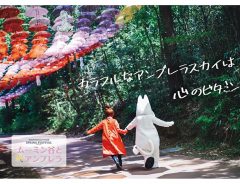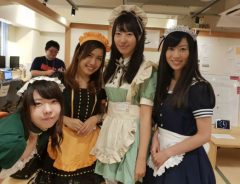
Source: © ValuePress Co., Ltd.
Metaverse talents specializing in feminized kawaii voice sing at the Babiniku Kohaku 2021 concert
- Tags:
- babiniku / feminized voice / metaverse / SDGs / Virtual Bishōjo Nem / Virtual Reality / voice feminization
Related Article
-

New green tea house in Japan offers on-the-go morning bottle service
-

Moominvalley Park’s umbrella sky to be upcycled by sustainable plastic brand PLASTICITY
-

This tasty Japanese twist on coleslaw could help you avoid food waste
-

New line of shopping bags and gift boxes from Cosme Kitchen use sustainable materials
-

Japanese Tech School Lets Students And Maids Learn Game Programming Together For Mutual Benefit
-

Marrying VR Anime Characters In Japan Makes For A Pretty Empty Wedding Ceremony


Babiniku and feminized voice in the metaverse
According to the "Social VR Lifestyle Survey 2021," a survey of 1,197 metaverse users jointly conducted by the Swiss cultural anthropologist and Vtuber researcher Ludmila Bredikhina (@BredikhinaLand) and the self-professed "world's first" independent Vtuber and HTC VIVE brand ambassador Virtual Girl Nem (@nemchan_nel) between August 23rd and September 9th, 2021, nearly 80% of users, regardless of gender, reported that they use a female avatar.
Image courtesy of Virtual Girl Nem (@nemchan_nel)
Since 89% of the respondents were from Japan, (6% were from North America, 3% from Europe), the survey, while also partly reflecting more universal tendencies of metaverse users, can thus be considered mainly representative of Japanese metaverse culture.
Morever, about 17% of all respondents reported that they modify their voices using technologies such as voice changers. More than half of those users modify their voices to sound more feminine. Surprisingly, 39% of biologically female users with female avatars who used voice changers did so because they wanted to make their voice "cuter." This indicates the tendency of both male and female metaverse users to aspire towards "cute voices" matching their cute avatars.
Image courtesy of Virtual Girl Nem (@nemchan_nel)
Although the term originally designated both men and women, today, babiniku バ美肉, short for バーチャル美少女受肉 bācharu bishōjo juniku, literally "virtual incarnation of a beautiful young girl,” is primarily used for men who use "anime" style female avatars in the metaverse and make efforts to feminize their voices through voice changers and other technological means.
In addition to those who rely on technology, there are also those who prefer more "natural" means to achieve this result. As revealed in the abovementioned survey, 5% of respondents indicated that they used methods such as voice training to speak in a different gender voice. Those who do so are known in Japanese as 両声類 ryōseirui, a homophone for 両生類, meaning "amphibian.” The term 両声類, which literally means "ambi-vocal," is sometimes translated in English as TransVoice, although it is not necessarily associated with transgender people.
Babiniku Kōhaku 2021
Image courtesy of Virtual Girl Nem (@nemchan_nel)
On December 4th, 2021, two teams of talented singers representing both "factions" of feminized voice performers in the metaverse converged at a special event called バ美肉紅白2021 Babiniku Kōhaku 2021. This was the second year that the event was held. For those unfamiliar with Japanese television, the event's name is inspired by the most famous kōhaku (literally "red and white") competition, the 紅白歌合戦 kōhaku utagassen (Kōhaku singing competition) broadcast every year by NHK on New Year's Eve.
In this case, the red and white teams were represented by four singers who used voice changers and four "ambivocal" singers. Both teams demonstrated their proficiency and singing techniques.
The event was highly successful, as nearly 1,7000 people gathered to enjoy their kawaii voices in the cluster VR platform.
Image courtesy of Virtual Girl Nem (@nemchan_nel)
Moreover, to promote metaverse culture, the entire archive of the event is available to the public for free.
You can enjoy a digest version of the event below, while the full archive can be viewed at the bottom of this article:
Red Team: Ryōseirui
The Red Team was formed of carefully selected members from the かえるの音楽会 Kaeru no Ongakukai (literally, "frog music festival") a ryōseirui talent VR music event hosted by VTuber hal.
hal (@haldosei)
A Vtuber and 3D modeler with 13 years of singing experience, hal is a leading presence in the ryōseirui community.
Image courtesy of Virtual Girl Nem (@nemchan_nel)
噛ませ戌 kamaseinu (@kamaseinyunuko)
Virtual widow now working at the VRC girls' bar "Castrato."
Image courtesy of Virtual Girl Nem (@nemchan_nel)
あまちじょんこ Amachi Jonko (@john_amachi)
Synthetically generated legal loli, instructor at the 声質研究会 Voice Quality Research Society.
Image courtesy of Virtual Girl Nem (@nemchan_nel)
みるにぃ Miruny (@miruny1665)
27-year-old OL ("office lady") voice ryōseirui who loves to sing and dance. Hello! Project fan.
Image courtesy of Virtual Girl Nem (@nemchan_nel)
White Team: Voice changer talents
The elite voice-changing singers of the White Team were chosen from among the top ranked talents in a contest for cover performances of Virtual Girl Nem's original song "Phantom Sense."
バーチャル美少女ねむ Virtual Girl Nem (@nem_channel)
As the self-professed world's first independent Vtuber, official ambassador for HTC VIVE, singer, novelist, and metaverse researcher, Virtual Girl Nem has been featured in domestic and international media and is recognized as one of the founding figures of Japanese metaverse culture.
Image courtesy of Virtual Girl Nem (@nemchan_nel)
もこねもこ Mokone Moko (@moconemocomoco)
Virtual singer and otokonoko 男の嫁 (MtF crossdresser).
Image courtesy of Virtual Girl Nem (@nemchan_nel)
月山縁 Tsukiyama Yukari (@keyboard_yukari)
Mechanical keyboard enthusiast.
Image courtesy of Virtual Girl Nem (@nemchan_nel)
松尾悠里 (@Yuri_Matsuo_V)
Voice changer enthusiast.
Image courtesy of Virtual Girl Nem (@nemchan_nel)
And the winning team was...
After the four members of each group took turns singing, the Red Team was selected by popular vote, winning 44 points to the White Team's 32 points. They praised each other's performances, and then all the members sang together.
Image courtesy of Virtual Girl Nem (@nemchan_nel)
All told, a total of 710 people came to the specially designed concert space in the cluster VR platform, and together with the 952 viewers who watched on YouTube, a total of 1,662 people enjoyed the event, cheering on the performers who showed off their best kawaii singing voices.
You can watch the full event here: